Nigeria’s Boko Haram insurgents striking schools, farms

KANO, Nigeria -- Nigerian soldiers and police once had the most to fear from the Al Qaeda-linked Islamist militia Boko Haram. But the insurgents’ latest targets include farmers, irrigation officials, schoolchildren and teachers.
In northeastern Nigeria, one of the poorest regions of the country, about 19,000 farmers have abandoned their crops in recent months because of attacks and threats by Boko Haram rebels, according to government officials.
Children are afraid to go to school because of recent attacks. Eighteen people, 16 children and two teachers, have been killed since Sunday in insurgent attacks on two schools in the Borno capital, Maiduguri, and another northeastern town, Damaturu. Two attackers also died, according to authorities.
Boko Haram opposes secular education and secular governance, seeking to impose Islamic law, or sharia, across Nigeria. The nation is divided between the predominantly Muslim north, where unemployment and poverty are rife, and the mainly Christian south. The rebellion, once confined to sporadic attacks, has turned northeastern Nigeria into a war zone.
The Nigerian government Thursday banned the use of satellite phones in northern Nigeria, saying that Boko Haram has been using the phones to plan attacks. Cellphone signals have also faced interruption by the government, as it struggles to crush the rebellion.
In addition, Borno state agriculture commissioner Usman Zannah said that serious food shortages are expected in the region this year because of crop failures brought on by the exodus of thousands of farmers from around New Marte town after rebels took control in January.
That would be a significant failure by the state and national governments to reinvigorate the region and avert hunger through a wheat and rice irrigation project launched last year near New Marte. The national government provided about 25,000 acres of land, seed, expertise and other incentives to farmers as part of the project.
Zannah said the effort has suffered mainly because insurgents drove out program administrators, and farmers were threatened with violence, attacked or killed.
Ahmad Bura, who had been cultivating more than 85 acres of wheat and rice, said the crops were almost ready for harvest about three months ago when he and his family fled New Marte and moved to Gamboru Ngala town on the border of Cameroon.
“I lost my 35 hectares of rice and wheat, which would have fetched me lots of money if I had harvested it,” Bura said in a phone interview. “It is painful to lose such a huge swath of crops, but we would have lost our lives and the crops if we had stayed.”
Another farmer, Bukar Ngamdu, who also fled with his family from New Marte to Gamboru Ngala, said anyone who cooperated with officials was in danger.
“To [Boko Haram insurgents], anyone working with the government in whatever way is condemned to death,” Ngamdu said. “I lost 50 hectares [about 123 acres] of wheat which was nearing maturity. I had to choose between my life and my wheat and I chose to save my life, which is dearer to me.”
Nigeria’s military launched attacks on insurgent camps near New Marte last month and regained control of the town. But the larger goal, to break Boko Haram’s hold on the region, remains elusive.
President Goodluck Jonathan declared a state of emergency in several northern states after attempts to negotiate a peace deal with the militants failed.
Zannah said the agriculture project called for farmers and the government to split the crops, but that Boko Haram’s influence left about 8,500 to 12,000 acres unharvested.
“The abandoned rice and wheat withered and were eaten up by cattle,” he said. “We anticipate food shortage in this region this year. We have lost huge tonnages of rice and wheat due to the Boko Haram insurgency.”
ALSO:
Young revelers inject new life into Iran’s capital
Egypt’s Morsi sparks anger with Islamist picks for top posts
Global Voices: An immigrant’s uphill push for a greener Greece
robyn.dixon@latimes.com
Times staff writer Dixon reported from Johannesburg, South Africa, and special correspondent Abubakar from Kano.
More to Read
Sign up for Essential California
The most important California stories and recommendations in your inbox every morning.
You may occasionally receive promotional content from the Los Angeles Times.










